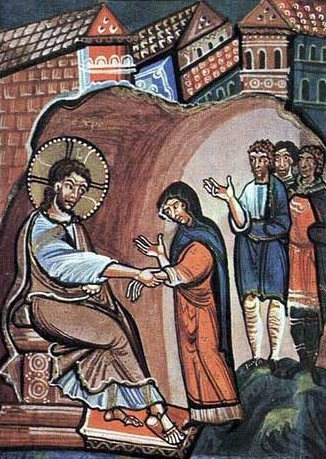Christian Art | Prayer With Jesus | Psalms | Praise For God’s Help | King David As A Boy | Audio KJV | Love Revealed By Jesus Christ | King James Audio Bible
YouTube: Psalm 146 KJV | King James Audio Bible | Word Aloud
Psalm 146 | King James Audio Bible
Psalm 146 declares importance of lifelong praise to God. The psalm opens with a compelling invitation to praise, ‘Praise ye the LORD. Praise the LORD, O my soul,’ setting a tone of devotion that is meant to last throughout one’s life. This directive is a fundamental declaration, essence of the psalmist’s message: that praise to God is an eternal commitment, deeply personal and unwavering.
The psalm expresses caution against misplaced trust, specifically advising against reliance on human leaders for ultimate salvation or hope. ‘Put not your trust in princes, nor in the son of man, in whom there is no help,’ it advises, highlighting the transient nature of human life and power. This warning is stark, juxtaposing impermanence of human existence, where plans and promises end with death, with God’s eternal and unchanging nature. This serves as a poignant reminder that while human leaders may offer temporary solutions, their ability to provide lasting help is limited.
The psalm shifts focus to God as the ultimate source of help and hope, extolling God as the creator of all that exists. It acknowledges God’s sovereignty over creation and God’s enduring faithfulness: ‘Which made heaven, and earth, the sea, and all that therein is: which keepeth truth for ever.’ This verse not only celebrates God’s creative power but also God’s unwavering commitment to truth and justice.
A significant theme throughout Psalm 146 is God’s concern for the marginalized and vulnerable. The psalm details God’s actions in caring for the oppressed, feeding the hungry, and freeing prisoners, highlighting God’s active involvement in ensuring justice and providing for those in need. ‘The LORD openeth the eyes of the blind: the LORD raiseth them that are bowed down: the LORD loveth the righteous,’ it declares, portraying a God whose compassion extends to all aspects of human suffering and injustice.

![]()
Psalm 146 | King James Audio Bible
Praise ye the LORD. Praise the LORD, O my soul.
While I live will I praise the LORD: I will sing praises unto my God while I have any being.
Put not your trust in princes, nor in the son of man, in whom there is no help.
His breath goeth forth, he returneth to his earth; in that very day his thoughts perish.
Happy is he that hath the God of Jacob for his help, whose hope is in the LORD his God:
Which made heaven, and earth, the sea, and all that therein is: which keepeth truth for ever:
Which executeth judgment for the oppressed: which giveth food to the hungry. The LORD looseth the prisoners:
The LORD openeth the eyes of the blind: the LORD raiseth them that are bowed down: the LORD loveth the righteous:
The LORD preserveth the strangers; he relieveth the fatherless and widow: but the way of the wicked he turneth upside down.
The LORD shall reign for ever, even thy God, O Zion, unto all generations. Praise ye the LORD.

![]()
Psalm 146 | King James Audio Bible
- Praise As A Lifelong Commitment: The psalm emphasizes the importance of praising God throughout one’s entire life, highlighting praise as a continuous, personal act of devotion.
- Transient Nature Of Human Power: The psalm warns against placing trust in human leaders and power, pointing out their temporary nature and inability to provide ultimate help or salvation.
- God As The Ultimate Source Of Help And Hope: The psalm identifies God as the only reliable source of help and hope, contrasting divine reliability with human unreliability.
- God’s Sovereignty And Creativity: The psalm affirms God’s sovereignty as the Creator of everything, underscoring God’s authority over the created world.
- God’s Care for the Marginalized: The psalm details God’s actions in caring for the oppressed, hungry, prisoners, blind, and those bowed down, reflecting God’s concern for justice and provision for the needy.
- Protection And Justice For The Vulnerable: The psalm highlights God’s protection for strangers, the fatherless, and widows, and God’s opposition to the ways of the wicked, showcasing God’s role as protector and judge.
- Eternal Reign Of God: The psalm concludes with a proclamation of God’s eternal reign, affirming the enduring nature of God’s kingdom in contrast to the fleeting nature of earthly realms.
- Call To Continuous Praise: The psalm both begins and ends with calls to praise God, framing the entire text as a hymn of praise and trust in God’s eternal power and care.

![]()








